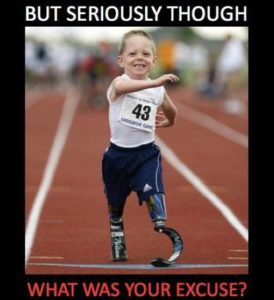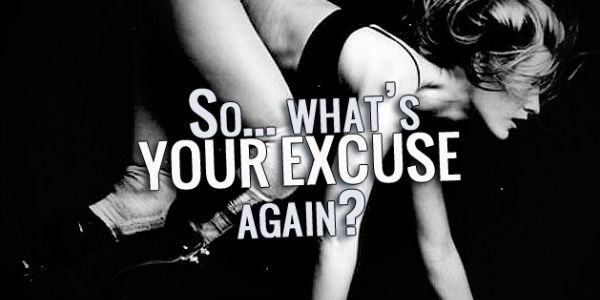Written by Mackenzie Saunders:
The other day, I was scrolling through Facebook, as I always do to procrastinate studying for my exams. I came across a picture a family friend shared on their profile; the image showed a man with a prosthetic leg running in a marathon, and at the bottom of the image, bold letters read, “What’s your excuse?”
This really frustrated me. It wasn’t the picture itself that upset me: in fact, I love public images that show people with disabilities being active and healthy. What’s negative about this picture —harmful, even—is the bold-lettered caption, “What’s your excuse?”
This is a classic example of what’s referred to as “inspiration porn”. I know, it’s a pretty brash name. Coined by disability rights activist Stella Young, “inspiration porn” is a phrase that describes the incredibly frustrating set of images on social media, in television, and in movies that portray people with disabilities as nothing more than objects of inspiration.

Inspiration porn often portrays people “overcoming” their disabilities, such as picturing a man with a prosthetic leg running, or showing a woman stepping out of her wheelchair after being paralyzed. These images are often used to inspire others, encouraging the mindset of, “If this person can do it, then I can do anything!” While these images are not always negative, the inspiration porn mindset can be. Through inspiration porn, the public portrays people with disabilities as “feel-good” stories about overcoming obstacles. People with disabilities are never actually portrayed as who they really are: regular, everyday people.
One in five Americans live with a disability, totaling to around 49 million people across the country. Further, it’s estimated that there are 2.7 million wheelchair users in the United States. That’s a lot of people! When we’re only picturing these people as products of their disability, we’re not acknowledging who they are as individuals. If we keep sharing pictures that frame the disability community as “inspirational”, we’re making it harder to view the millions of people with disabilities as people who want to be treated equally and fairly.
Inspiration porn also frames disability as something that can always be “overcome” and even cured. The caption “What’s your excuse?” implies that there is no excuse for not living a conventionally active lifestyle. The picture I saw on Facebook seems to ask the question, “If the man with the prosthetic leg can run, then why can’t you?”
Why can’t I, you ask? I was paralyzed from the waist down when I was 11! A lot of disabilities, like spinal cord injuries, can’t be cured. A lot of people, like me, will always be disabled. So, when we frame disability as something that can be overcome, we disregard all of the people with permanent disabilities. By saying, “What’s your excuse?”, we’re essentially telling people with disabilities that they could be working harder to overcome their condition.

I can’t speak for the entire disability community, but I can speak for myself when I say this: all I want is to be treated like everybody else, and I think a lot of disabled people feel the same way. I don’t want my disability to set me apart as “different” or even “inspirational”, because ultimately, my disability doesn’t define me. I want to be recognized for who I am as a person: my character, my intelligence, my actions, my accomplishments—not just my disability.
Inspiration porn exploits people’s disability stories simply to give non-disabled people feel-good narratives to make them feel inspired. Inspiration porn also frames disability as something that can be overcome, even though this is oftentimes not the case. But people with disabilities don’t exist to make non-disabled people feel good. We’re not here to be your inspiration; we’re here to live our lives to the fullest, just like everyone else.
The reality of inspiration porn is that a lot of people don’t understand how harmful it can be. And if our society keeps creating and fueling inspiration porn, disability will never be normalized. So, if you happen to come across a classic example of inspiration porn on your Facebook feed, I encourage you to join me in fighting back against these images. It’s up to us—the people who know how inspiration porn hurts the disability community—to help educate the public on the proper portrayal of people with disabilities.
Because we’re not your inspiration; we’re your peers.


